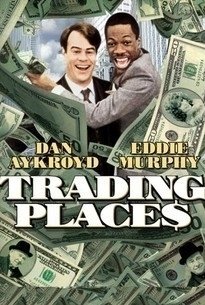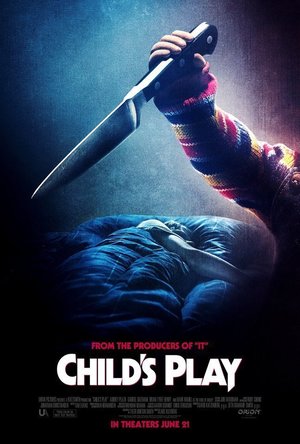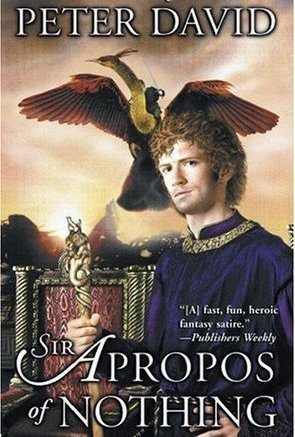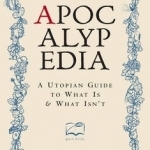
The Apocalypedia: A Utopian Guide to What is and What isn't
Book
Encyclopaedias and dictionaries are often boring, of no help when it comes to secretly filling train...

The Oxford Book of English Short Stories
Book
The Oxford Book of English Short Stories , edited by A. S. Byatt, herself the author of several...
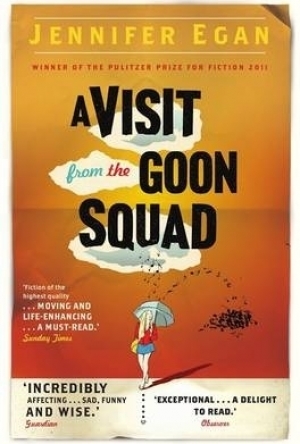
A Visit from the Goon Squad
Book
Jennifer Egan's spellbinding novel circles the lives of Bennie Salazar, an ageing former punk rocker...
Ed Helms recommended Trading Places (1983) in Movies (curated)
Kelly Knows (95 KP) rated Child's Play (2019) in Movies
Jun 25, 2019
JT (287 KP) rated I'm Still Here (2010) in Movies
Mar 10, 2020
As far as performances go this is one of Joaquin’s best, and all he had to do was grow a grizzly beard, smoke a lot and write some of the most ridiculous rap lyrics ever! But if this is genuine satire then he put his heart and sole into it!
When he was interviewed by David Letterman (who had no idea the whole thing was a hoax) Phoenix looked like a shadow of his former self
Chewing gum, and slopped in his chair he was totally unresponsive to the abuse he was getting, and back stage vented his anger. The more outrageous scenes are the ones that create the most hilarious and deliver the shocking impacts, such as sniffing coke from the bosom of a prostitute, to having his face shat on by a so called friend.
What is the most cringe-worthy to watch is Phoenix’s pitiful attempts at rapping, the bloke has about as much musical talent as Jedward and he gets his fair share of heckles, in each venue that he some how manages to get a gig for.
“I’ve got a million dollars in the bank, what have you got!?” comes Pheonix’s response, and then he proceeds to hurl himself into the crowd fists swinging, followed by violent vomiting.
To think that a man of P Diddy’s calibre would even consider letting some disheveled tramp off the street play him tracks from his demo is unbelievable in itself. Diddy’s eyes say it all as he asks Phoenix to skip on to the next one, continually starring down the camera in sheer disbelief!
There is not a lot to suggest that an actor such as this would just suddenly melt down, of course we don’t deny the pressures in Hollywood might cause few to sink to a lowest ebb, but Affleck succeeds in making this a shocking and truly hilarious stunt.
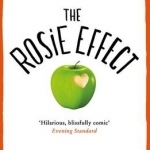
The Rosie Effect
Book
The Rosie Effect is the charming and hilarious sequel to Graeme Simsion's bestselling debut novel...
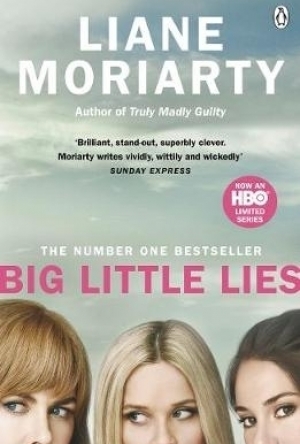
Big Little Lies
Book
Don't want Big Little Lies to end? Then why not order Liane Moriarty's new hit, Truly Madly...
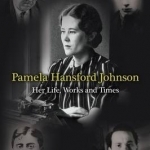
Pamela Hansford Johnson: Her Life, Work and Times
Book
This first biography of Pamela Hansford Johnson (1912-1981) has been written with the full...
Mandy and G.D. Burkhead (26 KP) rated Sir Apropos of Nothing in Books
May 20, 2018
So when I picked up Sir Apropos of Nothing, I did so based on the title pun and the back-of-the-book synopsis that promised “a berserk phoenix, murderous unicorns, mutated harpies, homicidal warrior kings, and – most problematic of all – a princess who may or may not be a psychotic arsonist.” I expected another lighthearted riff on the familiar archetypes. Murderous unicorns? Unicorns are not typically described as such! Oh teehee, how unexpectedly humorous!
Sir Apropos of Nothing is a satirical fantasy, just like it promised, though at times it’s hard to tell how much of the story is played for laughs and how much is played straight. See, the thing about satire that’s easy to forget at times is that it’s not synonymous with buffoonery. Make no mistake – Apropos is a funny book, full of witty dialogue and groan-inducing puns. It’s a book that takes great delight in lampshading traditional fantasy tropes and archetypes, as well as the entirety of Joseph Campbell’s Hero’s Journey idea. But it is not always a silly lampshade; sometimes a cliche or trope is pointed out to have its inherit ridiculousness laughed at, and sometimes it is pointed out because it is causing real and lasting pain or damage, either to the society in which it is set or, more often, to the titular Apropos himself and his ever-degrading esteem of both the people around him and himself.
The tone, at first, is hard to pin down. The story starts in media res with the main character being caught by a knight while in mid-coitus with that knight’s wife and escalates from there. The second chapter opens with a fourth wall-breaking narrative admission by Apropos himself that this was done with the express purpose of catching your attention, and now we’re going back to cover Apropos’s childhood, which ends up being equal parts dark, tragic, punny, and conveniently trope-filled – all of which Apropos, as narrator, approaches with the same resigned, blasé outlook.
If this sounds a bit jarring, well, it kind of is. Early on, I wasn’t sure what to think of where the story was trying to go or what I was expected to feel about it. After the first turn from cliché to dark and visceral to light and punny, all within a few pages, I caught myself thinking, “Crap, is this book gonna try and mix goofy jokes with serious drama and thoughtful moral quandary?”
The answer is yes. And it pulls it off fantastically.
This is due in large part to the interesting depths of the antihero, Apropos, who seems to be so named purely for the joke in the title. In Apropos we see a deep sense of justice and rightness that is entirely eclipsed by an even deeper cynicism and an unshakeable instinct for self-preservation. His life is objectively terrible, but rather than brood and lament, he adjusts. He keeps his head down when he can, weathers abuse when he can’t, and learns to deal with the constant shit storm, all the while bottling his growing anger and resentment at a world that would allow such amounts of suffering and hypocrisy to go unchecked. The fact that he himself becomes a selfish, hypocritical, and generally awful person is not lost on him, and the result is a flawed, unheroic, pathetic coward of a protagonist, a magnificently multifaceted bastard who doesn’t spare even himself from his vast and withering contempt.
And it’s a blast. It really is. Apropos is refreshingly pragmatic and unabashedly pessimistic, a welcome change from the typical righteous-yet-humble heroes of traditional fantasy, or even the loveable and untalented everyman in over his head of traditional fantasy spoofs. Despite a portentous birthmark (on his ass, no less) and beginnings that are not “humble” so much as “poverty of the dirtiest kind,” Apropos is everything a hero should not be short of outright evil.
And this, as it turns out, is entirely the point. This is where the satire, funny or otherwise, really shines through. This is the crux that elevates Sir Apropos of Nothing from a generically self-aware fantasy story to an original and memorable subversion of storytelling as a whole.
Without giving too much away, there comes a point in the plot where Apropos realizes that the events surrounding his miserable life are part of a heroic tale that has been preordained by Fate and is now being epically written out by Destiny. And despite his birthmark, his tragic past, and his mother’s constant reassurances that he has some sort of great destiny hovering over him, he is not the hero. He is only a minor character. A walk-on role on the hero’s stage. A brief pit-stop along the hero’s journey. An NPC whose dreams, desires, and continued existence are so far below importance to the story as to be utterly negligible.
And once this finally clicks with him, he violently, brazenly rebels against it. He gives an emphatic middle finger to Fate’s ideas and sets about making Destiny sit up and take notice of him again. He momentarily and violently overcomes his own abject cowardice just long enough to find a way to completely wreck the traditional heroic ballad in which he lives, all on the basis that, dammit, the world owes him more than this, and nobody should be so miserably cursed as to live their entire life as a foil character.
At this point in my own reading, I didn’t know whether to cheer him on or worry about the repercussions of his actions, because he doesn’t suddenly become heroic when this happens. He’s exactly as much of a selfish, lying bastard as before, and however bad you feel for him, you can completely understand why he was never cast for this role in the first place. Add to this the complete disregard of the author for following what seems to be the obvious progression of events in favor of twists that take you completely by surprise, but still make complete sense and arise organically from the story itself, and you eventually give up thinking that you have any sense of where the story’s going or how any event is going to play out. From beginning to end, it feeds you familiar ideas and then completely subverts them, introduces clichés and then proceeds to tear them apart, and you laugh and pity and feel something the entire way through.
In short, Sir Apropos of Nothing is a book that will keep you turning page after page – not necessarily because of the gripping drama (although it has that) or because of any breezy humor (although it has that too), or because the narration itself oozes suspense (although it often does), but because, with the rapid infusion of new and creative ideas and the hidden depths of character constantly bubbling to the surface in everyone involved, you honestly never know what’s going to happen next. If you like fantasy and can stand to have your expectations messed with, Apropos is certainly apropos.
